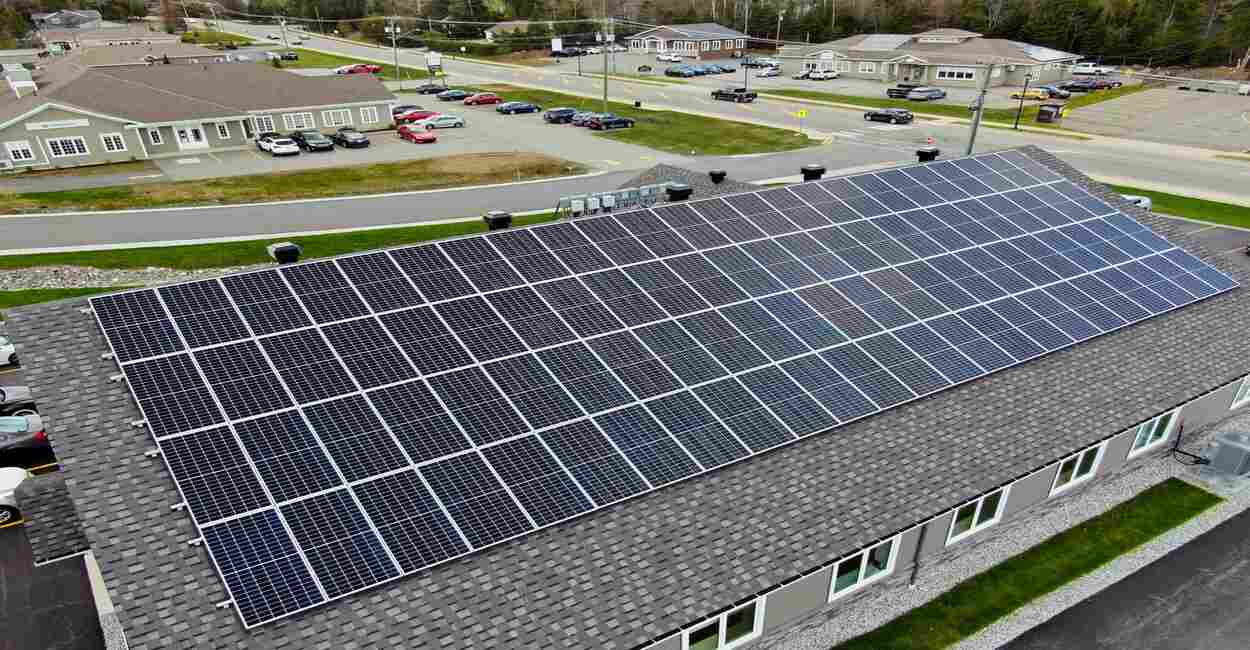The Benefits Of Solar Energy For The Healthcare Industry And How It Is Being Implemented

Solar energy is an increasingly popular source of clean and renewable energy, and it is being implemented in various industries worldwide. One industry that can particularly benefit from the use of solar energy is the healthcare industry. In this article, we will explore the benefits of solar energy for the healthcare industry and how it is being implemented.
Benefits of solar energy for the healthcare industry:
Cost savings:
The healthcare industry is one of the largest consumers of energy, and the cost of electricity is a significant expense for hospitals and clinics. Solar energy can help healthcare facilities reduce their energy bills and save money. By installing solar panels, healthcare facilities can generate their own electricity and reduce their dependence on the grid. This can result in significant cost savings, which can be reinvested in patient care and medical research.
Reliability:
Power outages can be devastating for healthcare facilities, and they can result in the loss of life-saving medical equipment and medications. By using solar energy, healthcare facilities can ensure a reliable and uninterrupted power supply, even during power outages. Solar energy systems can be designed to include battery storage, which can provide backup power when the grid goes down.
Environmental sustainability:
The healthcare industry has a responsibility to promote public health and environmental sustainability. By using solar energy, healthcare facilities can reduce their carbon footprint and promote environmental sustainability. Solar energy is a clean and renewable source of energy, and it does not produce greenhouse gases or other harmful pollutants.
Enhanced reputation:
By implementing solar energy, healthcare facilities can enhance their reputation and promote their commitment to environmental sustainability. This can be attractive to patients, investors, and employees, and can help healthcare facilities differentiate themselves from competitors.
Implementation of solar energy in the healthcare industry:
Solar panels on the roof:
One of the most common ways to implement solar energy in the healthcare industry is by installing solar panels on the roof. This allows healthcare facilities to generate their own electricity and reduce their dependence on the grid. The size and design of the solar panel system can be tailored to the energy needs of the healthcare facility.
Solar carports:
Another way to implement solar energy in the healthcare industry is by installing solar carports in parking areas. Solar carports can provide shade for parked cars while also generating electricity for the healthcare facility. This can be a cost-effective way to implement solar energy, as the carports serve a dual purpose.
Solar thermal systems:
Solar thermal systems can be used to provide hot water and heating for healthcare facilities. These systems use solar collectors to absorb heat from the sun, which can then be used to heat water or air. This can be a cost-effective way to implement solar energy, as it can reduce the reliance on traditional heating systems.
Solar-powered medical equipment:
Solar energy can also be used to power medical equipment in remote or off-grid areas. This can be particularly useful in developing countries, where access to electricity is limited. Solar-powered medical equipment can help improve the delivery of medical care in these areas and reduce the dependence on fossil fuels.
Solar Energy Solutions For The Healthcare Industry
Solar energy is becoming an increasingly popular choice for healthcare facilities as they look for ways to reduce their carbon footprint, lower energy costs, and improve the reliability of their power supply. In this article, we will explore some of the solar energy solutions available to the healthcare industry.
Solar Panels on the Roof:
One of the most common solar energy solutions for healthcare facilities is to install solar panels on the roof. The size and design of the solar panel system can be tailored to the energy needs of the facility. This allows healthcare facilities to generate their own electricity and reduce their dependence on the grid. The excess electricity can be sold back to the grid, which can further reduce energy costs.
Solar Thermal Systems:
Solar thermal systems can be used to provide hot water and heating for healthcare facilities. These systems use solar collectors to absorb heat from the sun, which can then be used to heat water or air. This can be a cost-effective way to implement solar energy, as it can reduce the reliance on traditional heating systems.
Solar-Powered Medical Equipment:
In remote or off-grid areas, healthcare facilities may struggle to access reliable electricity. This is where solar-powered medical equipment comes in. Solar-powered equipment can help improve the delivery of medical care in these areas and reduce the dependence on fossil fuels. This can be particularly useful in developing countries, where access to electricity is limited.
Energy Storage Systems:
Energy storage systems are an essential part of any solar energy solution. They store excess electricity generated by the solar panels during the day for use during the night or during periods of low sunlight. This can help healthcare facilities reduce their reliance on the grid and ensure a reliable power supply.
Solar-Powered Emergency Backup Systems:
Power outages can be devastating for healthcare facilities, and they can result in the loss of life-saving medical equipment and medications. By using solar energy, healthcare facilities can ensure a reliable and uninterrupted power supply, even during power outages. Solar energy systems can be designed to include battery storage and solar-powered emergency backup systems, which can provide backup power when the grid goes down.
The Role Of Solar Energy In Modernizing Healthcare Infrastructure
The healthcare industry is an energy-intensive sector, with hospitals and healthcare facilities consuming large amounts of energy to operate equipment, power lights, and maintain temperature-controlled environments. The adoption of renewable energy, particularly solar energy, can help modernize healthcare infrastructure by reducing energy costs, improving energy efficiency, and increasing energy security. In this article, we will explore the role of solar energy in modernizing healthcare infrastructure.
Reducing Energy Costs:
One of the most significant benefits of solar energy for healthcare facilities is cost savings. Solar energy provides a reliable and cost-effective alternative to traditional energy sources. Hospitals and healthcare facilities can use solar energy to generate electricity on-site, reducing their reliance on the grid and lowering their energy bills. In many cases, the cost savings can be significant, allowing healthcare facilities to redirect resources towards other areas, such as patient care.

Improving Energy Efficiency:
Another way that solar energy can modernize healthcare infrastructure is by improving energy efficiency. Healthcare facilities consume a significant amount of energy for heating and cooling, lighting, and running medical equipment. By installing solar panels, healthcare facilities can generate their own electricity, reducing the amount of energy they need to draw from the grid. This, in turn, can reduce the strain on the grid and improve energy efficiency across the board.
Increasing Energy Security:
Hospitals and healthcare facilities require a reliable and uninterrupted power supply to maintain critical operations. Power outages can be disastrous, resulting in the loss of life-saving medical equipment and medication. Solar energy systems can provide a reliable and uninterrupted power supply, even during power outages. By installing solar panels and battery storage systems, healthcare facilities can ensure that they have access to a reliable power supply, even when the grid goes down.
Promoting Environmental Sustainability:
The healthcare industry has a significant carbon footprint, accounting for approximately 10% of global carbon emissions. By adopting solar energy, healthcare facilities can reduce their environmental impact and promote sustainability. Solar energy is a clean and renewable energy source, producing zero greenhouse gas emissions. This can help healthcare facilities meet sustainability goals and reduce their carbon footprint.
Enhancing Reputation:
Adopting solar energy can also enhance the reputation of healthcare facilities. Consumers are increasingly conscious of the environmental impact of the products and services they use, and healthcare facilities that adopt sustainable energy sources, such as solar energy, can demonstrate their commitment to environmental sustainability. This can enhance the reputation of healthcare facilities, attract new patients and staff, and improve the overall perception of the healthcare industry.
Innovations In Solar Energy Technology For The Healthcare Sector
Innovations in solar energy technology are continuously being developed to meet the needs of the healthcare sector. One of the recent developments is the integration of solar energy with battery storage systems. This allows healthcare facilities to store excess solar energy generated during the day and use it during peak demand periods, such as at night or during power outages. This technology can significantly increase energy security and reduce energy costs for healthcare facilities.
Another innovation is the use of solar-powered water heaters in healthcare facilities. Hot water is required for a range of healthcare applications, including sterilization and cleaning. Solar-powered water heaters can provide a reliable and cost-effective solution for heating water, reducing energy costs and promoting sustainability.
Finally, advances in solar panel technology have led to the development of more efficient and durable solar panels. These panels are designed to withstand extreme weather conditions and can generate more electricity per square foot of panel area. This technology can help healthcare facilities maximize the amount of solar energy they can generate on-site, improving their energy efficiency and reducing their reliance on traditional energy sources.
Overall, these innovations in solar energy technology can help healthcare facilities reduce their energy costs, improve energy efficiency, increase energy security, promote sustainability, and enhance their reputation. As the healthcare sector continues to face pressure to reduce costs and improve sustainability, the adoption of solar energy is likely to become increasingly common.

The Future Of Solar Power In The Healthcare Industry
The future of solar power in the healthcare industry is promising, with the potential for continued growth and adoption. As healthcare facilities become more aware of the benefits of solar energy, including cost savings, energy efficiency, and environmental sustainability, they are likely to continue to invest in solar energy solutions. Advances in solar technology, such as more efficient solar panels, battery storage systems, and solar-powered water heaters, will make it even easier and more cost-effective for healthcare facilities to adopt solar energy.
In addition to technological advancements, policy changes and government incentives may also drive the adoption of solar energy in the healthcare industry. Governments and regulatory bodies are increasingly recognizing the importance of renewable energy sources and are implementing policies to encourage their adoption. For example, tax incentives, rebates, and subsidies are available to healthcare facilities that adopt solar energy solutions, reducing the upfront costs of installation and making solar energy more accessible to a wider range of healthcare facilities.
As the healthcare industry faces increasing pressure to reduce costs, improve sustainability, and ensure energy security, the adoption of solar energy is likely to become more widespread. The future of solar power in the healthcare industry is bright, with the potential to transform the way healthcare facilities generate and consume energy, reduce their environmental impact, and enhance their reputation as leaders in sustainability.
Bottom Line
In conclusion, the adoption of solar energy can help modernize healthcare infrastructure by reducing energy costs, improving energy efficiency, increasing energy security, promoting environmental sustainability, and enhancing reputation. Healthcare facilities that adopt solar energy can redirect resources towards other areas, such as patient care, and improve the overall efficiency of their operations. Healthcare facilities should work with a reputable solar energy company to design and implement a solar energy solution that meets their specific needs and energy goals.

